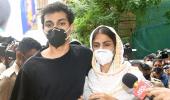Certain kind of media reportage in pending matters was critically referred to before the Supreme Court by Attorney General K K Venugopal on Tuesday who said it 'totally forbidden' and may amount to contempt of court.

The top law officer was appearing before a bench headed by Justice A M Khanwilkar to assist it in the hearing of the 2009 contempt case against activist lawyer Prashant Bhushan and journalist Tarun Tejpal.
Venugopal was granted time to reformulate certain issues for its consideration in the contempt case in which the apex court in November 2009 had issued notices to Bhushan and Tejpal for allegedly casting aspersions on some sitting and former top court judges in an interview to news magazine Tehelka. Tejpal was the editor of the magazine.
Venugopal, during the brief hearing via video conferencing, referred to the comments of 'electronic and print media' in pending court cases and said that they are 'totally forbidden'.
"Today electronic media and print media are commenting on cases which are pending and it is seeking to influence the court," he said.
Today, in big cases when bail applications are about to come up for hearing, TV reports are shown which are very 'damaging for the accused who has filed the bail application', he said.
He also referred to the media reporting in the Rafale case and said that such comments about pending cases should not be made.
"These things are totally forbidden and may amount to contempt of court," Venugopal said, adding that he would like to discuss it with senior advocate Rajeev Dhavan, counsel for Bhushan, and all other lawyers appearing in the matter.
The bench, which also comprised Justices B R Gavai and Krishna Murari, took note of the submissions of Venugopal and said that he can consider reformulating the points which are required to be dealt by the bench and listed the case for further hearing on November 4.
"In the meantime, the Registrar judicial to get in touch with Harish Salve" to discuss the case and request him to appear before it on the next date of hearing, the order said.
Dhavan, at the outset, said that perhaps some questions were needed to be reformulated in the case.
Venugopal agreed to the views and said that perhaps a fresh look at the proposition given by Dhavan was needed.
Earlier, the top court had accepted the plea of Bhushan to seek assistance of the Attorney General in the contempt case against him and Tejpal.
Prior to this, a bench headed by Justice Arun Mishra (since retired) had decided on August 25 to refer the matter to another bench to deal with certain larger questions related to freedom of speech and levelling of corruption charges against the judiciary.
Dhavan had told the court that 10 questions of constitutional importance have been raised by them and they needed to be dealt with by a constitution bench.
The court had then not agreed to Dhavan's submissions that it should seek assistance of the Attorney General in dealing with the issues raised and said that 'it is best left to the appropriate Bench' which will be set up by the Chief Justice of India.
Dhavan had said that questions raised by Bhushan included the issue whether bona fide opinions of corruption also constitute contempt of court and 'whether it is enough to show bona fide of opinion or it is necessary for the person to prove the allegation of corruption'.
They also included whether a complainant is barred from discussing in public domain the contents of his complaint if an in-house inquiry is started, among others, he had said.
On August 17, the top court had framed certain questions and asked the parties to address it on three issues-- whether such statements about corruption against judges or judiciary can be made, in what circumstances they can be made and what is the procedure to be adopted with respect to sitting and retired judges.
Bhushan had also filed 10 questions on his own and sought adjudication by a constitution bench.
'Whether the expression of a bona fide opinion about the extent of corruption in any section of the judiciary would amount to contempt of court,' Bhushan's plea had said.
'If the answer to the question is in the affirmative, whether the person who expresses such an opinion about the extent of corruption in a section of judiciary is obliged to prove that his opinion is correct or whether it is enough to show that he bona fide held that opinion,' the second question read.
He had also given eight other questions related to freedom of speech and expression and the width and scope of contempt powers.
In response to the 2009 contempt case, Bhushan had earlier told the apex court that making corruption charges against judges would not amount to contempt of court and mere utterance of corruption charge could not be contempt of court.










